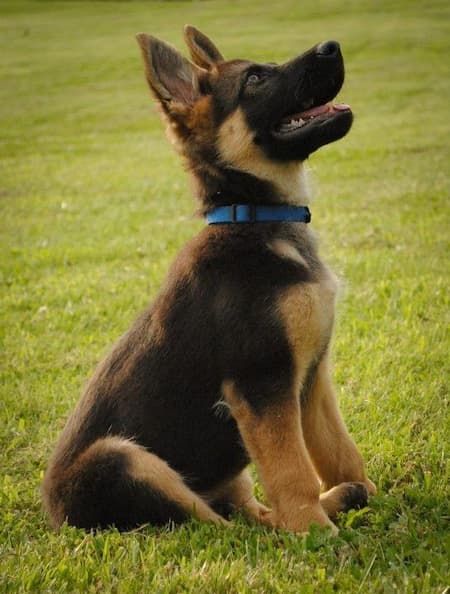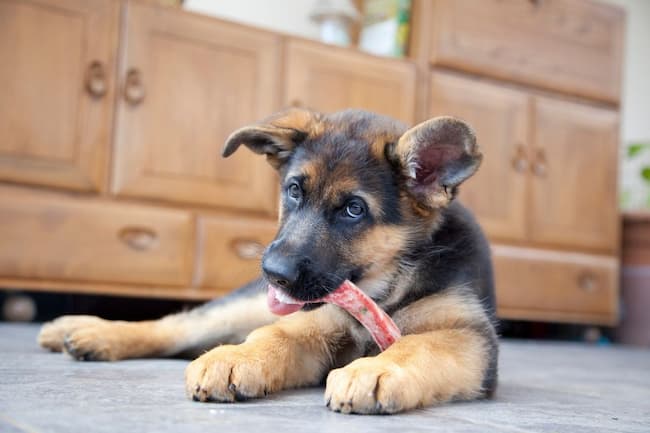If you have adopted or going to adopt a German Shepherd puppy, you may be wondering how to take care of them during their first three months. After all, this is the time when your pup will grow rapidly and develop its character. Taking care of a 3 month old German Shepherd puppy is no easy task.

In this blog post, we’ll cover everything you must know about taking care of a 3 month old German Shepherd: from their height and weight at this age, to tips on potty training and diet. We’ll also discuss preventive healthcare measures you should be aware of. Read on for our comprehensive guide on caring for a 3 month old German Shepherd puppy!
3 Month Old German Shepherd
The first few months are crucial for the development of your puppy and require ample attention and care. German Shepherds are known to be highly intelligent and loyal dogs that require a lot of training, nutrition, and overall care to grow into healthy adults.
Dogs until they turn one year old, puppies are considered to be in the ‘growth’ stage of their development. This is a time when they will grow rapidly and develop good habits that will last them a lifetime. We will cover everything you need to know about taking care of a 3 month old German Shepherd, including their height, weight, training, health, diet, and overall care.
If your pup is turning three months old, then you must know how to care for them. Here are some of the most important points to remember when it comes to caring for a 3 month old German Shepherd puppy:
Height and Weight
German Shepherd puppies will be growing rapidly. At three months of age, the average height for a male German Shepherd puppy is around 16.4 inches, and for a female GSD, it’s around 15.2 inches. As for a 3 month old German Shepherd weight, a male GSD puppy should weigh around 30-40 pounds.

While a female GSD should weigh around 25-35 pounds. Their ears will be almost fully developed at this age as well. It is important to keep an eye on their weight, and if they appear to be too thin or too fat then consult your vet immediately.
Potty Training
By 3 months, your pup should be starting to learn how to potty train. Potty training can take some patience but is much easier if you stick to a consistent routine. Start by taking your puppy out every two hours, and reward them for going to the right places. Have designated potty areas and use treats or praise words when they go to the correct spot.
Health
German Shepherds are generally known for their good health and do not suffer from many genetic health issues. However, it’s important to be aware of potential health problems that can occur in GSD puppies such as hip dysplasia, elbow dysplasia, or bloat. It’s imperative to keep up with regular vet checkups, vaccines, and deworming schedules.
Training
Training is important for German Shepherd puppies as they are highly intelligent and a well-trained dog will make for a great companion. Consistent training is essential for your puppy, so it’s important to find a regimen that works for your schedule.

Basic training commands such as sit, stay, and come are the foundation for good behavior and can be worked on daily for 3 month old German Shepherds. Obedience training classes are highly recommended for GSD puppies as well. It’s important to expose your puppy to various social situations early on to minimize anxiety and aggression later on in life.
Vaccinations
If your puppy is 3 months old, then they should have already had their first round of vaccinations. It’s important to keep up with your pup’s vaccine schedule as this will protect them from various illnesses and diseases.
Diet
German Shepherds require a well-balanced diet to maintain optimal health and growth. It’s important to choose high-quality dog food that suits their age and size. GSD puppies should be fed a diet consisting of high-quality protein, fat, and carbohydrates. Avoid feeding them table scraps, which can lead to digestive problems and obesity.

Care
Lastly, overall care is important for your GSD puppy. Provide ample exercise and socialization activities such as walks, visits to the park, etc. Grooming regularly to keep their coat clean and shiny and free from mats. It’s important to establish a good sleeping routine, providing them with ample rest. Mental stimulation through playtime and interactive toys is essential for this intelligent breed.
More Similar Articles
- Blue heeler german shepherd mix puppy
- Cane corso german shepherd mix puppy
- 6 month old german shepherd weight
Conclusion
Taking care of a 3 month old German Shepherd puppy can be a challenging and rewarding experience. With consistent training, a well-balanced diet, regular vet checkups, and ample exercise and socialization the results will be a loyal, intelligent, and healthy companion for many years to come. If you have any questions, feel free to reach out to German Shepherdss. We hope this article was helpful.

